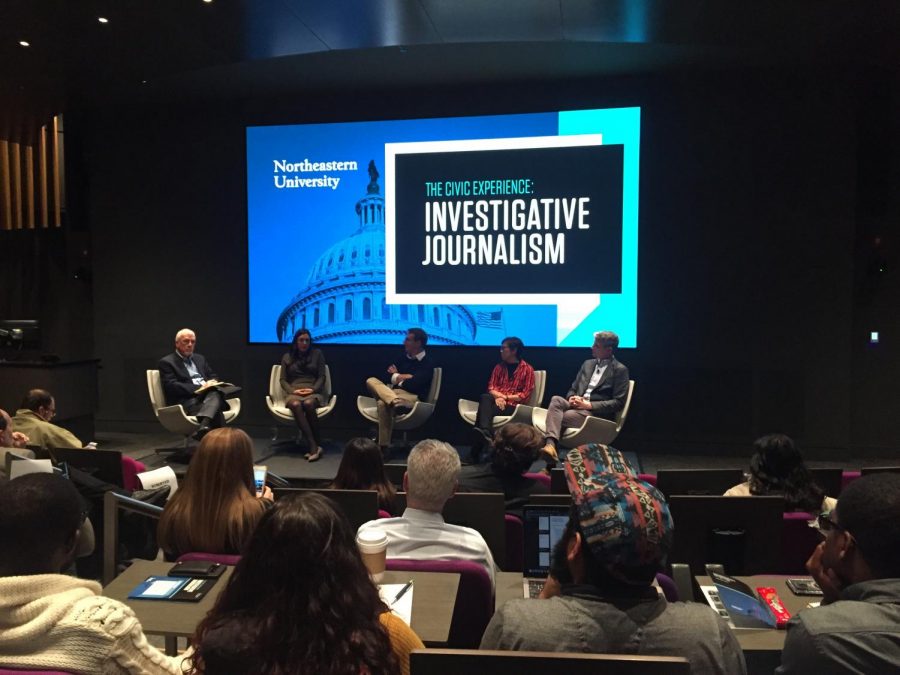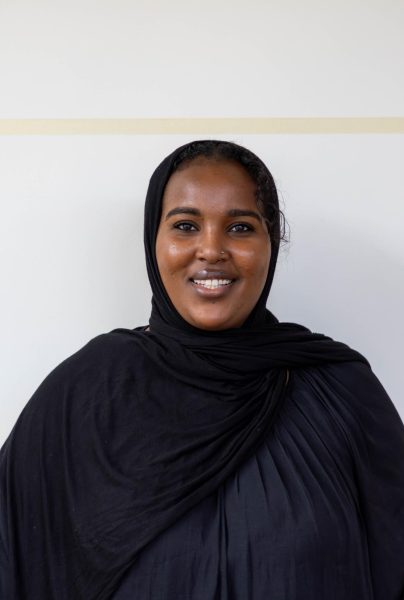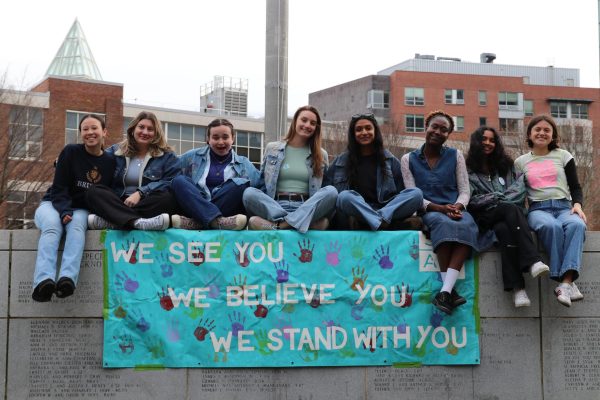Journalists discuss contemporary investigative journalism
Journalists gather for an investigative journalism panel on Oct. 28.
October 30, 2019
Journalists, students and faculty gathered in the Interdisciplinary Science and Engineering Complex Oct. 28 as a panel of reporters shared behind-the-scenes details of the work that went into reporting on their biggest stories as part of Northeastern’s Civic Experience speaker series.
Panelists spoke on becoming experts in new fields as they worked within their beats. Some of the reporters said they became investigative journalists on the job after finding a clue they were not looking for.
“Quite frankly, I think any really strong reporter should be an investigative reporter of a sort,” said Patricia Wen, editor of The Boston Globe’s Spotlight Team.
Moderated by The Boston Globe’s Walter Robinson, the panel also included Renee Dudley, a technology reporter at ProPublica; David Fahrenthold, a reporter at the Washington Post covering the Trump family and its business interests; and Joe Palazzolo, a legal affairs reporter at The Wall Street Journal.
Dudley said she set up a Google alert for ransomware, malicious software that holds computer files hostage, and read through nearly 1,200 articles before she stumbled upon an industry that conducts transactions on behalf of ransomware victims.
The first edition of the five-part series profiled two companies, Monster Cloud and Proven Data Recovery, that are commissioned by law enforcement. Both companies paid the ransoms while telling clients they were not doing so. Dudley gathered public records of contracts and correspondence and spoke to former employees and clients.
“I was taken by surprise, because I didn’t realize that this was a whole industry,” she said. “This hadn’t come up in any of my research … That tip became the starting point for our entire series.”
Palazzolo discussed reporting on hush money payments made by Michael Cohen, U.S. President Donald J. Trump’s former personal attorney, to women the president allegedly had affairs with after Palazzolo’s editor received a tip that there was a lawyer in Los Angeles representing these women.
“We didn’t have any particular experience with this world,” Palazzolo said.
Spotlight’s investigation into Aaron Hernandez, a former New England Patriots player charged with three murders, started with a public records request.
“I didn’t know that there would be anything. I didn’t even really think that deeply about the jail calls at the time,” Wen said. “But then … he did kill himself in prison.”
Wen said the Spotlight team gets countless tips through all forms of communications and though the team now consists of five reporters, it is impossible for them to get through everything.
“I don’t feel I have the resources to possibly [get to everything]. I’m sure there are great stories that I am completely ignoring. And in a way I feel most guilty about that,” she said.
Fahrenthold discussed his experience reporting on the 2016 presidential election. During a rally he was covering, Trump brought out an oversized $100,000 check from the Donald J. Trump Foundation addressed to a local veterans’ charity.
“I have been to a lot of presidential campaign rallies and I had never seen someone give away a charitable donation. And the reason why is because that’s illegal,” Fahrenthold said.
Fahrenthold investigated and discovered that during a Republican debate Trump skipped, he held a charitable event. At this event, Trump said he raised $6 million for veterans, $1 million of which was from his own pocket — which was the money he was giving away.
“After that we realized, wow, this guy under … the brightest spotlight we have in American journalism, which is a presidential campaign, he was going to try to weasel out of a commitment, to give $1 million dollars to veterans, the most honored group in our society. And he was willing to try that, given the incredibly high stakes. What was he doing before?” Fahrenthold said. “And it is that that kind of began a whole series of reporting.”
After Trump took office, the Trump Organization would often respond to Fahrenthold without much detail or would fail to respond at all and then give their responses to other news organizations. Fahrenthold then began posting his questions on Twitter to show that he was asking for specific information, not just a comment.
When asked about distrust in the media, Fahrenthold said he sometimes encounters people who do not want to speak with him, but that is not always the case.
“You would be stunned to know how many people who are around Trump and in public say ‘Oh, fake news. I hate the news media,’ who do nothing all day but talk to the news media,” he said.


















